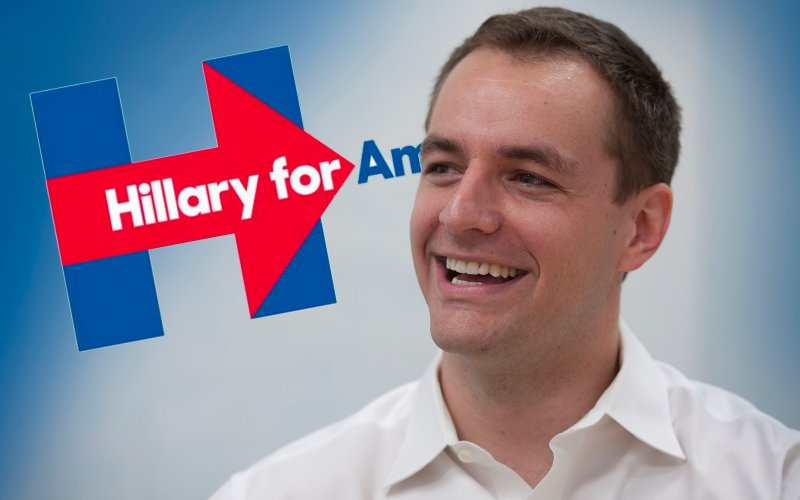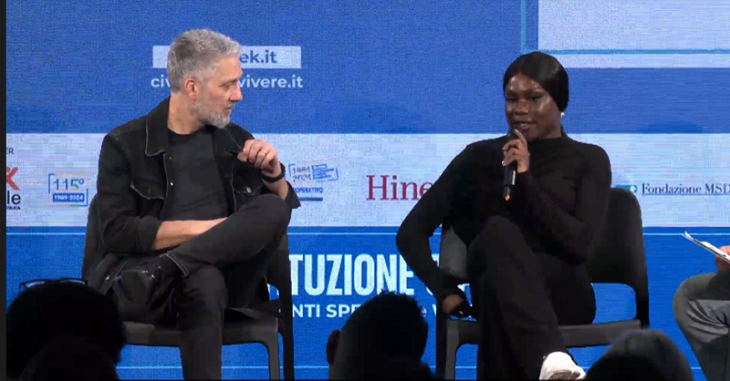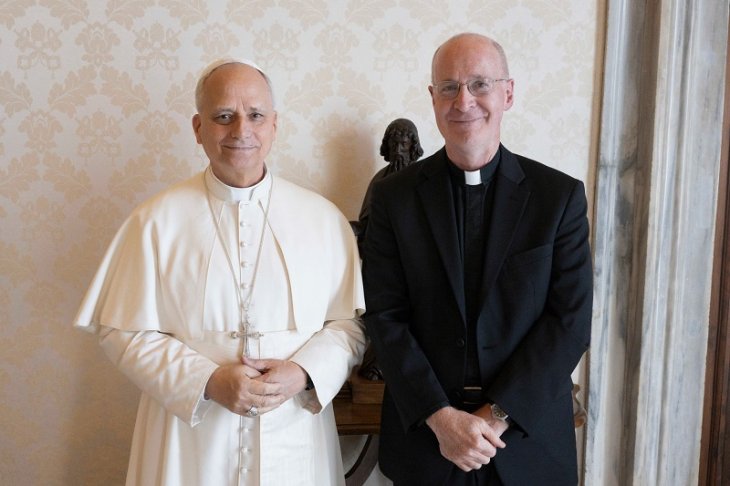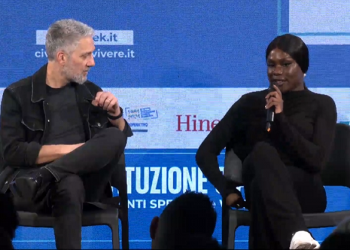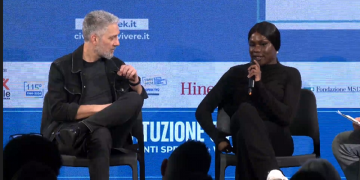
BY CHRIS JOHNSON | Following the unexpected defeat of Hillary Clinton, LGBT political observers are calling for a reassessment of the Democratic Party — and the candidate’s gay campaign manager is being criticized by some in the aftermath of one of the most shocking political upsets in American history.
Some Democrats are saying Clinton campaign manager Robby Mook pursued the wrong strategy in a “change” election and relied too heavily on projecting an image of Clinton as an establishment candidate.
Had Mook succeeded in guiding Clinton to victory, he would have been the first openly gay campaign manager of a major U.S. party presidential nominee, and he would have elected the first female president. Instead, Clinton lost and the Democratic Party, now in the minority in every part of the federal government, is in disarray and without a clear leader.
Wayne Besen, a Chicago-based gay activist and radio host known for his opposition to widely discredited “conversion therapy,” said Mook came off as the “kind of man you’d want to take home and introduce to mom and dad,” but didn’t enact the right strategy to combat Donald Trump’s low-brow campaign tactics.
“We needed a campaign manager who effectively channeled the fear and anger felt by those left behind by globalization and the technological revolution,” Besen said. “We needed someone, particularly against Trump, who was a political brawler. Unfortunately, Mook was often feckless in media appearances and looked shifty. He spoke with little emotion and seemed to be reading off DNC talking points. He appeared as if he was afraid to mess up, when he should have spoken with conviction, charisma, and authority.”
Besen, a Bernie Sanders supporter in the Democratic primary, added Mook “made a mistake” with the choice of Sen. Tim Kaine (D-Va.) as Clinton’s running mate, saying the vice presidential nominee performed well, but “was the wrong man for this peculiar moment in American history.”
“On my daily radio show in Chicago, I repeatedly warned that Trump’s only path to victory was the Rust Belt,” Besen said. “Thus, the Clinton campaign should pick an anti-trade firebrand stalwart like Sanders or Warren and shuttle them between the Great Lakes and Pennsylvania. Instead they went in the opposite direction and paid dearly for this mistake.”
Besen tempered his criticism of Mook by saying he “competently ran a sophisticated, sprawling campaign operation” and won the popular vote, even though Clinton didn’t end up winning the election through the Electoral College system. According to election results posted on CNN, Clinton as of Tuesday surpassed Trump in the popular vote by about 800,000 votes.
On the day after the election, Hillary Clinton omitted Mook from the list of those she thanked during her concession speech, although she recognized Kaine and his wife, President Obama, first lady Michelle Obama, Bill Clinton and Chelsea Clinton.
But Daniel Pinello, a gay political scientist at the City University of New York’s John Jay College, rejected the idea Mook’s omission had any significance.
“I caution against reading too much into remarks made in a concession speech by a candidate who had had no opportunity to recover from a grueling months-long campaign schedule and who had just experienced a great — and largely unexpected — career tragedy,” Pinello said. “It’s very hard under such circumstances for even the most composed individual to remember thanking everyone appropriately.”
Trump won the election largely in part to victories in the Rust Belt states of Michigan, Wisconsin and Pennsylvania, which have traditionally been “blue” states in presidential elections. The results in those states were a surprise because prior to Election Day, polls there showed Clinton with a comfortable lead.
The Trump campaign seems to have been more aware those states were in play than the Clinton campaign. According to NBC News, Trump in the last 100 days of the election out-campaigned Clinton in states that ended up being critical on Election Day. In Ohio, Trump made 26 rally appearances compared to the 17 made by Clinton. In Michigan, Trump made 13 rally appearances compared to the six made by Clinton. In Wisconsin, Trump made six appearances while Clinton never once visited the state during that time period.
Jimmy LaSalvia, a gay independent and former Republican who endorsed Clinton, said Mook ended up filling the campaign with insiders and, in contrast to Trump’s team, no one who “could help them to see the need to express more empathy for Americans who feel shut out and screwed by the system.”
“I saw many examples of evidence that Mook and his team fundamentally missed the mood of the country,” LaSalvia said. “This election wasn’t about Republicans versus Democrats, it was about the insiders versus the outsiders. The Clinton campaign did too many things that highlighted their candidate’s insider status, and not enough to appear on the side of the outsiders.”
“If Mook had a winning message that he could organize around, then his organizational skills would lead her to victory,” LaSalvia said. “That didn’t happen. He and his candidate, being the establishment figures they are, just couldn’t see what they were missing.”
One aspect of Clinton’s campaign that stood out was running on the most advanced platform for LGBT rights of any major U.S. presidential candidate in history.
Surpassing even Obama in his bids for the White House in 2008 and 2012, Clinton ran on supporting marriage for same-sex couples as a constitutional right, comprehensive LGBT non-discrimination legislation known as the Equality Act, a vision for achieving an “AIDS-free generation” and a pledge to protect transgender Americans from disproportionate violence.
Besen said although the positions were unprecedented for a major U.S. presidential candidate, they helped Clinton rather than contributed to her defeat by Trump, who took anti-LGBT positions over the course of his campaign.
“I think that Clinton’s pro-LGBT platform helped her,” Besen said. “Had LGBT rights been toxic, Obama would not have been reelected. And North Carolina Gov. Pat McCrory would have cruised to reelection this year.”
(Indeed, McCrory, who signed the anti-LGBT House Bill 2 into law, appears to have narrowly lost in his bid for re-election in North Carolina even though Trump won the state comfortably and Sen. Richard Burr (R-N.C), another Republican, won re-election.)
Calls for new path for Democrats
Other observers insisted Mook performed well given the circumstances of the election year and the focus of examination shouldn’t be on the past, but the future and finding new leaders in the Democratic Party.
Eric Stern, a gay Berkeley-based Democratic activist who supported Sanders in the primary, said Mook and his team “worked tirelessly in support of their candidate and should be commended,” but the Democratic Party has to make changes.
“The candidacy of Bernie Sanders resonated with primary voters in Michigan and Wisconsin in a way that Secretary Clinton’s did not,” Stern said. “My hope is that as the Democratic Party begins to pick up the pieces and develop a game plan for the future — that Bernie Sanders, Elizabeth Warren and leaders from the communities made most vulnerable by the election of Donald Trump have real seats at the decision making table (as well as consideration for party leadership positions). Excluding the voices of those leaders at this critical moment — who represent millions of Americans — would be disastrous for our party.”
Stampp Corbin, a gay San Diego-based activist and publisher of LGBT Weekly, said the Clinton campaign made errors, but the abolition of the Electoral College should be a new priority for the Democratic Party.
“While I believe the Democrats squandered an opportunity to unite working class whites and minorities with an economic message a la Bernie Sanders, the real question is whether the Electoral College is still relevant,” Corbin said.
As Corbin noted, 2016 marks the fifth time in U.S. history a Republican ascended to the White House, even though a Democrat won the popular vote, and the second time after Al Gore lost to George W. Bush in the 2000 election that was ultimately settled by the U.S. Supreme Court.
“Perhaps the electors should vote their conscience on Dec. 19, which is their prerogative,” Corbin added. “Some might have to pay a small fine, less than a $1,000, a small price to pay to actually enforce the true will of the people.”
Mook declined an interview request for this article and the Clinton campaign didn’t respond to a request for comment.
According to media reports, Clinton during a 30-minute phone conversation with high-level donors on Saturday blamed her loss on letters FBI Director James Comey sent to Congress in the days before the election. The first letter 11 days before the election indicated a new investigation of her use of a private email server as secretary of state was underway, while the second letter exonerated her — yet again after initially being cleared in July — of any wrongdoing.
“There are lots of reasons why an election like this is not successful,” Clinton was quoted in the New York Times as saying, according to a donor who relayed the remarks. But, she reportedly added, “our analysis is that Comey’s letter raising doubts that were groundless, baseless, proven to be, stopped our momentum.”
Hilary Rosen, a D.C.-based Democratic activist, echoed the anger over Comey’s letters, which defied the agency’s general practice of not commenting publicly on investigations, when asked to evaluate Mook’s performance as campaign manager.
“I’m not into the blame game here,” Rosen said. “Robby put together a brilliant organization. Sometimes votes fall short of expectations. James Comey hurt momentum and turnout and Hillary had not a vote to spare. There were multiple issues beyond Robby’s control. I’m grateful for him giving it his all.”
Pinello echoed the sense that Comey reigniting the email scandal that dogged Clinton throughout her presidential campaign was a major factor in Clinton’s loss.
“To my mind, the most significant culprit for the Clinton loss was James Comey, whose unforgivable last-minute intervention in a presidential campaign rivals the worst of J. Edgar Hoover’s political subterfuges as FBI director,” Pinello said.
As for an inability to prevent losses in traditionally “blue” states of Wisconsin, Michigan and Pennsylvania, Pinello said Mook should be cut some slack.
“If virtually every American professional political pollster was dead wrong about Michigan, Pennsylvania, and Wisconsin — recall that, on Monday, FiveThirtyEight.com had Clinton with a 70-plus-percent probability of winning, while the figure at the New York Times was 84 percent — how could Robby Mook reasonably be held responsible for the loss of those states?” Pinello said. “After all, he was just campaign manager — not Merlin the Magician.”

